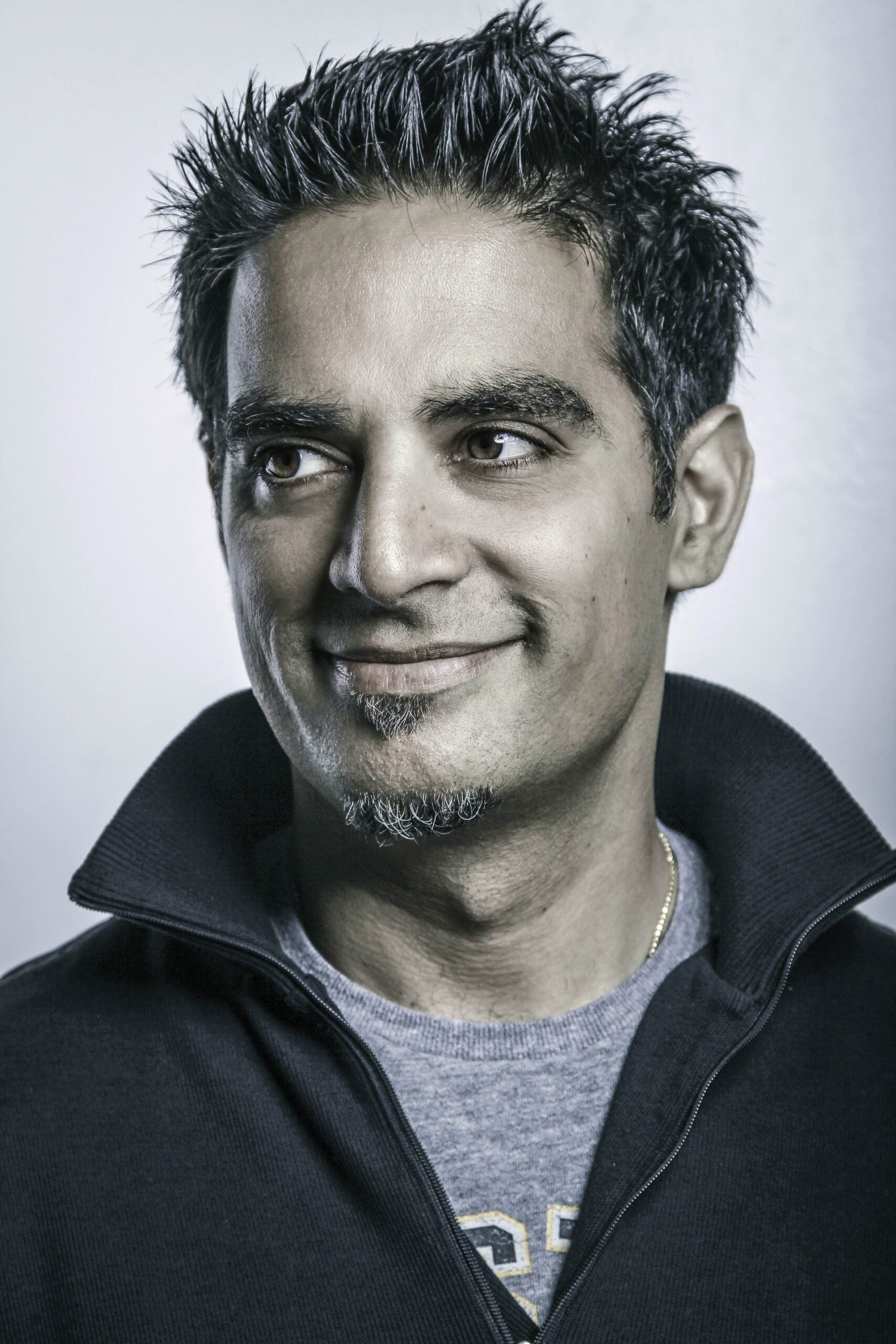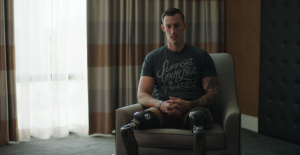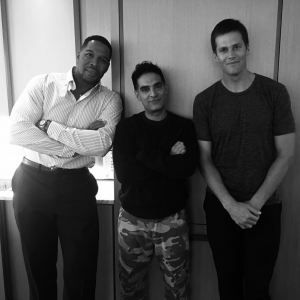
Gotham Chopra: The Robert Irvine Magazine Interview
He’s made critically-acclaimed sport documentaries about Kobe Bryant, David Ortiz, and Victor Cruz. His new documentary series, Religion of Sports, delves into the power of faith that surrounds our passions as fans and athletes. Here, Gotham Chopra shares insight into Season One, what’s in store for Season Two, and talks about what it was like growing up in the shadow of his father, world-renown spiritual guru Deepak Chopra.
BY MATT TUTHILL
Robert Irvine Magazine: At what point in your life did you fall in love with sports? Then at what point did you start to find this deeper meaning in them?
Gotham Chopra: Well, if I can pinpoint it, and I have thought about this, I think I was 11 years old. I grew up in Boston and I went to watch the Celtics playing the Bulls. I was huge a Celtics fan and Michael Jordan scored 63 points in the double overtime loss, the Bulls lost to the Celtics. Afterwards, Larry Bird said about Michael Jordan, “That wasn’t a basketball player. That was God disguised as a basketball player.” I think that really resonated with me. I was blown away. Then ever since I’ve always been fascinated by sports.
Obviously I grew up in a world in which my father, his spiritual life was always around us and evolving. I think a lot of things I started to hear him talk about—I started to see and feel the importance. So I think that’s probably the earliest time and it evolved from there.
RI: With everything you’ve filmed so far in The Religion of Sports, what is the most surprising thing that you’ve encountered?
GC: In hindsight it’s not surprising, but when we were doing Season One, it was actually the first episode that we filmed. It was down in the south where we did the NASCAR episode. We shot it in, maybe August; it was the heart of the political season. And the guy who was an essential character, a 29-year-old former marine who grew up in the south—frankly, he had very conservative values. He was the stereotype. He was the Southern Redneck and I was the Northeastern-er Yankee. We had nothing in common politically and to some extent culturally. But we had sports, and we really bonded over that.

Episode One, God in the Machine, explores the world of NASCAR, following an injured Marine-turned-driver who has a unique perspective on the concept of melding man and machine.
And I had never really been to a NASCAR race but I could still appreciate it. That’s what sports is. You see the deep divisions we have in so many areas right now, especially in this country, and yet we come together around this shared faith, which is sports. You see it in the ratings. You see it in the revenues. You see it in the attendance. Sports matter to us. I think that’s really kind of surprising considering how deep our other division are.
RI: I was surprised to see that you included eSports in Season One. I’m a big gamer myself and I know that competitive gaming has a massive and loyal following. But, certainly they’ve got a very long way to go in terms of true mainstream acceptance. Most people wouldn’t be aware of how grueling the training for that really is. How these people have to practice almost non-stop. Were you taken aback by how fierce that competition really is?
GC: Yeah, I think that was part of it. I was also surprised at the scale of it. I knew, because I hear about it all the time. But I think when you really look into it and you see how many people are watching, how many people are participating, how fast these arenas are selling out. Whether it’s in Seoul or in Los Angeles or in Toronto or whatever. I was surprised at the scale of it.
This is not some recreational activity. It’s a full-time job for some of them—or it’s their mission to make it a full-time job. Then again if you look at the amount of money some of them are making, the sponsorship… like other athletes in other sports, that isn’t luck. They’re practicing is fairly grueling in a very different way but very similar in terms of the time utility, the focus, the discipline.
It was also surprising to me to see their physical activity because I think there’s a stereotype of gamers where people complain all the time that there’s no physical activity and they’re sitting around on beanbags all day. That’s not the case. You now have these professional gamers where they have disciplined nutrition, exercise, sleep. The same thing that Kobe Bryant or Tom Brady practice, these guys are practicing.
RI: You’re a die-hard Patriots fan and you worked on this with not just with Tom Brady but also Michael Strahan. Those two guys were involved in the greatest Super Bowl upset of all time. Bringing two people who fought so fiercely against each other on the grandest of stages—I imagine there’s a story there.
GC: While they were rivals on the field, they had enormous respect off of it. Tom’s obviously going to be a Hall of Famer. Michael is a Hall of Famer. I think Tom has enormous respect for Michael in terms of what he’s accomplished off of the field. That being said, they’re still rivals. Every time they’re on a call together or every time we meet together, Michael will definitely remind Tom about those two Super Bowls—one that he participated in and the other one that the Giants won without him. They’re competitors, they can’t help it.
RI: What topics will you tackle in Season Two?
GC: We’re developing and researching and budgeting everything right now. I would say from the first season that our audience was drawn to some of these smaller niche sports. It’s very hard in the NFL or NBA to tell an impactful story unless you have a unique way in to tell original stories or if you have an enormous budget. sYet on the other hand, with some of these more niche sports or endurance sports like ultra-running, surfing, or free diving, you have people who are really eager to tell their stories and to share their stories, and the access is much easier.
Those are areas that I think we’re really exploring. I also think obviously as a creator, I love the stories I don’t know much about. So we’re looking into New Zealand right now around the All Blacks, which is one of the most successful sporting franchises in the history of sports. And yet it’s so far away from the mainstream in the US, that I don’t think many westerners really understand. That’s one of them. I think soccer is a perennial area of interest because it’s like the global faith. It’s like the one true religion that people pretty much on every continent believe in. So I think part of every season is going to have a soccer story in it.
RI: If you don’t have Direct TV or AT&T, do you see this series eventually migrating to a service like Netflix or Amazon?
GC: I think that Audience Network and Direct TV and AT&T have all sorts of ambitions. They just launched a new OTT (over-the-top, not requiring cable) platform themselves. It’s called Direct TV Now, and I think there will be other ways to get it. Right now AT&T is going through the massive acquisition of Time Warner and that means that HBO and all the stuff from the Turner Family will now be part of the AT&T family. I don’t really know what that means for us. I think one can look into the future and see all of that becoming integrated. Finally, specifically to the Netflix question you asked, I’m a huge Netflix consumer, but we are hopefully going to ensure that people internationally can see our show, because the DNA of our show is international. And so we are exploring partnership with Netflix on the international front.
RI: You’ve talked about how sports—not just the major professional sports on television—but that local sports in schools really bring us. Having played high school and college sports myself and then covering local sports for a daily newspaper, I also saw a great number of negatives with the intensity of sport at that local level. The biggest problem has to be parents living vicariously through the athletic endeavors of their children. The book Friday Night Lights did a great job with insight into that, and so did the documentary Trophy Kids. How do you reconcile that dark side as you extol the greater virtues of sports?
GC: That’s a great question, and I think … Listen, it is the religion of sports and every religion has scandals. And as religion itself has a very dark side, I think that is definitely the case with sports. I think that will increase in some of the stories we tell in Season Two and beyond. We’re going to bring some attention to that. I think you also, not unlike religion, the heart has a sort of truth to it. I think you need to talk about performance enhancing drugs, the money involved, and in the NCAA you see all the exploitation of athletes and stuff like that. I mean these are real issues.
But it’s sort of like the interpretation of the faith as opposed to the faith itself. I mean I continue to believe in the religion of sports, and at their heart, sports is about human potential and it’s about competition, and it’s about achievement, and pushing yourself. Those are all very admirable and aspirational qualities. But I see the negatives too. I’m the parent of a nine year old and I go to games and I’m like, “Wow.” I mean I love my kid and I’m proud of what he is doing, but he is not … I don’t think going to be a professional player. Ninety-nine percent of kids don’t and yet you see parents pushing, pushing, pushing. It bothers me as a parent, but nothing is perfect in life. I definitely recognize that shadow side and I do think it’s important to acknowledge and even talk about that in the context of the show. But I also think at the end of the day that sports have a sort of truth to them which continues to inspire me.
RI: Your father, he’s known the world over. He has millions of fans who look to him with incredible reverence. How would you even begin to describe the process of making your own name for yourself and going out into the world and not directly following in his footsteps? How difficult is that to do? Because I would imagine many of the people you meet, many of the interviews you do, people often would expect you to act or sound like him, or kind of be directly involved with his philosophy. How do you get out of that box and how do you make your own path?
GC: Sure. I mean I think you sort of answered it in your question. Those are other people’s expectations and while there may have been a time in my life when I was younger where I may have got caught up in that, or I may have been more conscious of that, now I’m not. I do what I love, which is exactly a quality I’ve learned from my father. Which is, you do what you love and you do what brings you fulfillment every day. And you don’t worry about the rest. Yes, my dad has millions of admirers, but he’s also got millions of detractors and critics and stuff like that.
I don’t think my father nor myself really worry about that. I don’t get caught up in other people’s expectations. I think that probably for me, it’s been also an evolution and a maturity that I’ve gained. And it’s not just professionally, it’s personally. It’s like when you become a parent, you realize, “Oh that’s my priority in life.” Right now especially what I’m doing with the show and all the other stuff, I do it because I love it. Not because it seems like the evolution of his brand or something like that. And I have to say my dad is my biggest supporter in that respect. I probably shouldn’t use the word preach with him but he sort of advocated that my whole life: Do what you love and that’s where you’ll be happy.
RI: Your documentary, Decoding Deepak, showed your dad as a human with flaws, and laid bare a lot of moments where his guard was down, moments most people would consider embarrassing. With now a couple of years of distance from that film, has your relationship evolved since it had time to sink in?
GC: Well I think first of all people watched that movie, myself included, they’re like, “Wow there’s a tension there.” I mean I watch, I’m like, “This is like really snarky.” And it’s true, and that definitely comes across. But there was no rift. We were working together on other projects. We are really close. I mean, if anything I’ve realized now that movie is could be called Decoding Gotham.
Looking back now, my kid is much older. I’ve learned a lot in terms of what it’s like to be a dad and the challenges that come with that. If anything I’ve probably gained a little bit more admiration and understanding for my father. So yeah. I’ll see my dad later tonight. We talk all the time and he’s a really supportive. I also have enormous respect for him independent of being his son, in terms of what he’s accomplished and how hard he works 24/7.
RI: Aside from you father, who in the field of spirituality do you admire? Do you read other people?
GC: Well, right now my father is in the practice of working with a lot of great minds. His newest book is called You Are The Universe, which he wrote working with a quantum physicist. He’s turned me and others onto the scientific community—many of these amazing minds who are, in a way, talking about the same thing he’s talking about, but more through scientific language. I also admire Don Miguel Ruiz and Marianne Williamson. A lot of these people frankly, I’ve known for years. I’ve obviously had good fortune and I have enormous respect for them. Eckhart Tolle is another person. I’m like a lot of other people. I’m an explorer. I read the stuff. I’m not a devotee necessarily but I think they have incredible wisdom.
RI: You’re fit and healthy yourself and you’ve also got a tremendous spiritual side. What is a piece of advice that you would offer to one of our readers who might be stuck? Who can’t put it together as they struggle to reach their goals?
GC: Find as much balance as you can and identify those things in your life that are taking away from that and make incremental steps. What is in your diet that you can’t shake? By no means am I perfect at this, but I try to find balance through good sleep, consistent exercise, a good diet—which doesn’t mean a perfect diet—and healthy relationships. I mean nobody’s perfect. I think I see it in my own life when I’m good at balancing those four things I’m just a happier, more productive person. When I get away from one of those things, I get too far out of balance. Those four things are never quite in balance, but when they are too far out of balance, I can feel it. I can feel it affecting my life and I just try to get back on the path.
You can stream the first episode of Religion of Sports for free by clicking here: religion-of-sports.com/episodes/


